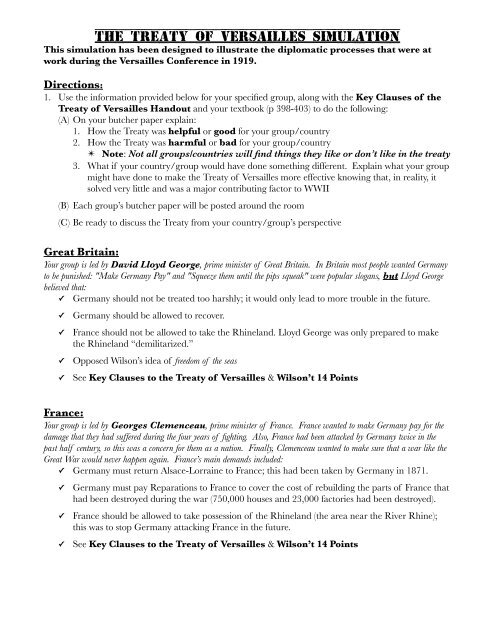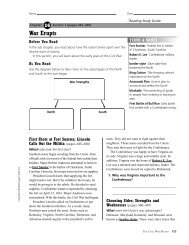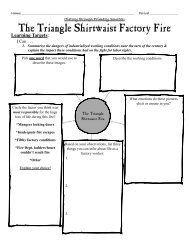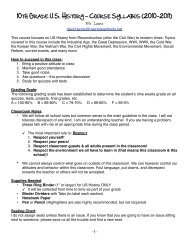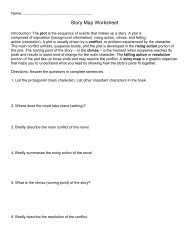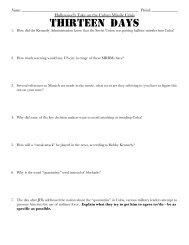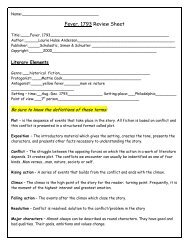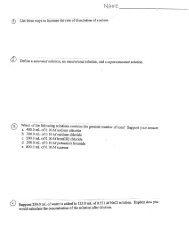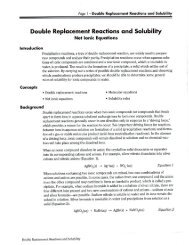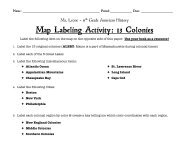Treaty of Versailles (Simulation)
Treaty of Versailles (Simulation)
Treaty of Versailles (Simulation)
You also want an ePaper? Increase the reach of your titles
YUMPU automatically turns print PDFs into web optimized ePapers that Google loves.
The <strong>Treaty</strong> <strong>of</strong> <strong>Versailles</strong> <strong>Simulation</strong><br />
This simulation has been designed to illustrate the diplomatic processes that were at<br />
work during the <strong>Versailles</strong> Conference in 1919.<br />
Directions:<br />
1. Use the information provided below for your specified group, along with the Key Clauses <strong>of</strong> the<br />
<strong>Treaty</strong> <strong>of</strong> <strong>Versailles</strong> Handout and your textbook (p 398-403) to do the following:<br />
(A) On your butcher paper explain:<br />
1. How the <strong>Treaty</strong> was helpful or good for your group/country<br />
2. How the <strong>Treaty</strong> was harmful or bad for your group/country<br />
✴ Note: Not all groups/countries will find things they like or don’t like in the treaty<br />
3. What if your country/group would have done something different. Explain what your group<br />
might have done to make the <strong>Treaty</strong> <strong>of</strong> <strong>Versailles</strong> more effective knowing that, in reality, it<br />
solved very little and was a major contributing factor to WWII<br />
(B) Each group’s butcher paper will be posted around the room<br />
(C) Be ready to discuss the <strong>Treaty</strong> from your country/group’s perspective<br />
Great Britain:<br />
Your group is led by David Lloyd George, prime minister <strong>of</strong> Great Britain. In Britain most people wanted Germany<br />
to be punished: "Make Germany Pay" and "Squeeze them until the pips squeak" were popular slogans, but Lloyd George<br />
believed that:<br />
✓ Germany should not be treated too harshly; it would only lead to more trouble in the future.<br />
✓<br />
✓<br />
✓<br />
✓<br />
Germany should be allowed to recover.<br />
France should not be allowed to take the Rhineland. Lloyd George was only prepared to make<br />
the Rhineland “demilitarized.”<br />
Opposed Wilson’s idea <strong>of</strong> freedom <strong>of</strong> the seas<br />
See Key Clauses to the <strong>Treaty</strong> <strong>of</strong> <strong>Versailles</strong> & Wilson’t 14 Points<br />
France:<br />
Your group is led by Georges Clemenceau, prime minister <strong>of</strong> France. France wanted to make Germany pay for the<br />
damage that they had suffered during the four years <strong>of</strong> fighting. Also, France had been attacked by Germany twice in the<br />
past half century, so this was a concern for them as a nation. Finally, Clemenceau wanted to make sure that a war like the<br />
Great War would never happen again. France’s main demands included:<br />
✓ Germany must return Alsace-Lorraine to France; this had been taken by Germany in 1871.<br />
✓<br />
✓<br />
✓<br />
Germany must pay Reparations to France to cover the cost <strong>of</strong> rebuilding the parts <strong>of</strong> France that<br />
had been destroyed during the war (750,000 houses and 23,000 factories had been destroyed).<br />
France should be allowed to take possession <strong>of</strong> the Rhineland (the area near the River Rhine);<br />
this was to stop Germany attacking France in the future.<br />
See Key Clauses to the <strong>Treaty</strong> <strong>of</strong> <strong>Versailles</strong> & Wilson’t 14 Points
The United States (Woodrow Wilson & the Democrats):<br />
Your delegation is led by Woodrow Wilson, the President <strong>of</strong> the United State <strong>of</strong> America. The U.S. had only declared<br />
war on Germany in April 1917. The U.S. had suffered no damage during the war. Wilson arrived in Europe with the<br />
“Fourteen Points,” which he hoped would help prevent wars in the future. Several <strong>of</strong> Wilson’s most important points<br />
included:<br />
✓ The peoples <strong>of</strong> Europe should be allowed to decide their own future (self-determination)<br />
✓<br />
✓<br />
✓<br />
Called for the end European Empires (end Imperialism)<br />
A League <strong>of</strong> Nations should be set up to settle disputes between countries in the future<br />
See Wilson’s 14 points<br />
The United States (Henry Cabot Lodge & the Reservationists):<br />
This group is back in the US & is critical <strong>of</strong> the <strong>Treaty</strong> <strong>of</strong> <strong>Versailles</strong> for several reasons. Focus on what Wilson brings<br />
back from Europe & don’t focus so much on what’s good or bad in the treaty as a whole, but rather what is good or bad for<br />
America & your power as a Congressman:<br />
✓ Many politicians, especially senators who must approve (ratify) the treaty in the United States<br />
opposed the provisions <strong>of</strong> the treaty, as well as the League <strong>of</strong> Nations because they feared it<br />
would tell the US what to do or where to fight.<br />
✓<br />
Believed that the League <strong>of</strong> Nations conflicted with the constitutional power <strong>of</strong> the U.S.<br />
Congress to declare war.<br />
Germany:<br />
The Allies gave Germany a new form <strong>of</strong> government based on proportional representation. It was intended to prevent<br />
Germany being taken over by a dictatorship, but it led to the creation <strong>of</strong> more than thirty political parties; none <strong>of</strong> them was<br />
big enough to form a government on its own. Germany had not been allowed to the Peace Conference and were told to accept<br />
the terms or else. Most Germans had believed that the <strong>Treaty</strong> would be lenient because <strong>of</strong> Woodrow Wilson's Fourteen<br />
Points. Many Germans did not believe that the German army had actually been defeated in 1918 because Germany had<br />
not been invaded. One <strong>of</strong> these people was Corporal Adolf Hitler, who had been in hospital in November 1918 recovering<br />
from gas-blindness. Like many others he came to believe that the army had been “stabbed in the back” by the “November<br />
Criminals,” the politicians who had signed the Armistice which had brought the Great War to an end on November 11,<br />
1918.<br />
Several <strong>of</strong> the clauses <strong>of</strong> the <strong>Treaty</strong> were thought to be very harsh. It was going to be almost impossible to pay the<br />
reparations. In fact, the German government gave up after only one year, and the War Guilt Clause seemed<br />
particularly unfair. How could Germany be the only country to blame for the war? After all it had started when a Serbian<br />
shot an Austrian. It was felt that Germany had simply been made a scapegoat by the other countries for all that had<br />
happened.<br />
Germany was required to:<br />
✓ Accept all <strong>of</strong> the blame for the war, the “War Guilt Clause”<br />
✓<br />
✓<br />
✓<br />
✓<br />
Reduce its army to 100,000 men and was not allowed to have conscription (draft)<br />
Reduce the navy to 6 warships and was not allowed to have any submarines<br />
Destroy all <strong>of</strong> its air force<br />
See Key Clauses to the <strong>Treaty</strong> <strong>of</strong> <strong>Versailles</strong>


